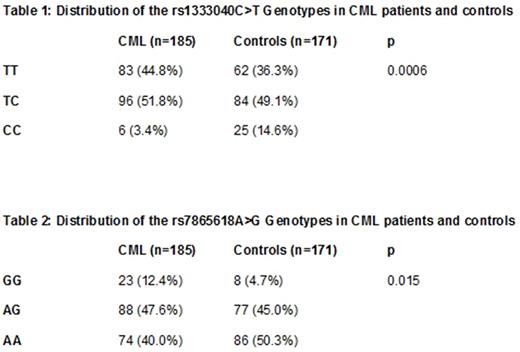Abstract
Introduction: During the last decade, single nucleotide polymorphisms (SNPs) on the chromosomal locus 9p21 have been associated with several cardiovascular (CV) diseases, such as stroke and myocardial infarction. In this study, we evaluated the association between two SNPs on 9p21 and Chronic Myeloid Leukemia (CML). As CML is generally treated with tyrosine kinase inhibitors (TKIs) and TKI therapy has been associated with increased vascular events by itself, we investigated the influence of SNPs on chromosome 9p21 on the incidence of CV events in subjects affected by CML who were in treatment with TKIs.
Patients and Methods: We studied 185 patients with CML and 171 unaffected controls. The median age at the diagnosis of CML was 55 years (range 17-84) and we enrolled 99 males and 86 females. All patients were treated with at least 1 TKI, with Imatinib being the most commonly used as first line therapy (71%). Previous CV diseases were taken into account and new CV events were recorded during follow-up. The median follow-up was 91,5 months (range 14-301). Genomic DNA was isolated from peripheral blood collected during follow-up and the rs1333040C>T and rs7865618A>G polymorphisms were assessed by PCR-RFLP using restriction endonucleases. For each SNP, we performed dominant, recessive, and additive genetic models. The association between SNPs on 9p21 and CML was evaluated using Chi-square test. In subjects affected by CML, to study the association between SNPs on 9p21 and CV events, Fisher's exact test was performed. In CML patients we also analyzed the correlation between SNP on 9p21 and age at diagnosis, sex, ethnic group, Sokal, Euro and Eutos risk, response to therapy.
Results: The distribution of the three possible genotypes of rs1333040 (TT, TC and CC) was statistically different between cases and controls (p=0.0006; Table 1). The TT genotype was significantly associated with CML in the dominant model (p=0.0001) but not in the recessive model (p=0.09). The T allele was significantly associated with CML in the additive model (p=0.004). Also, the distribution of the three possible genotypes of rs7865618 (GG, AG and AA) was statistically different between cases and controls (p=0.015; Table 2), and the GG genotype and the G allele were significantly associated with CML in the dominant (p=0.05), recessive (p=0.009), and additive models (p=0.009). We registered 37 CV events among patients affected by CML. Most of them (26) occurred before the introduction of TKI therapy. In patients taking TKI, 11 events were recorded. The TT genotype of rs1333040 was associated with an increased risk of CV events in CML patients (p=0.05) with no difference between patients taking or not taking TKI. Differently, patients carrying the "at risk" genotype of rs7865618 (GG) did not show increased risk of CV events compared to the control population. No correlation was found between CML patients characteristics and response to therapy and studied genotypes.
Discussion: Polymorphisms on chromosome 9p21 have been consistently associated with CV diseases in the general population. In this study, we demonstrate that the TT genotype of rs1333040 and the GG genotype of rs7865618 are significantly associated with CML. Patients affected by CML who are carriers of the TT genotype of rs1333040 show increased risk of CV events compared with non-carriers. The use of TKIs is not associated with increased risk of CV events in both carriers and non-carriers. The 9p21 chromosomal region deserves further investigation for its potential role in the genetic susceptibility to CML and associated CV events.
Abruzzese: Bristol Myers Squibb: Consultancy; Pfizer: Consultancy; Incyte: Consultancy; ARIAD: Consultancy; Novartis: Consultancy.
Author notes
Asterisk with author names denotes non-ASH members.


This feature is available to Subscribers Only
Sign In or Create an Account Close Modal